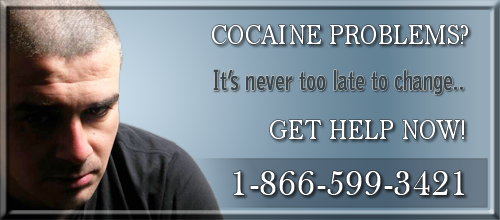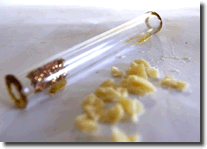About Cocaine
- What is Cocaine
- Effects of Cocaine
- Who Uses Cocaine
- Cocaine Statistics
- Cocaine Information
- Facts About Cocaine
- Dangers of Cocaine Use
- Signs of Cocaine Use
- About Cocaine
- Stages of Cocaine Addiction
- Cocaine Withdrawal
- Cocaine Overdose
- Cocaine Treatment
- Snorting Cocaine
- Smoking Cocaine
- Injecting Cocaine
- Crack Cocaine
- Using Cocaine with Alcohol
- Cost of Cocaine
- Cocaine Side Effects
- Cocaine Street Names
- Drug Tests for Cocaine
- History of Cocaine
- Cocaine User Pictures
- Cocaine Images

Smoking Cocaine
 Smoking cocaine typically involves the "freebase" form of cocaine otherwise known as "crack" cocaine. As the name implies, “freebase” is the base form of cocaine, as opposed to the salt or powder form of cocaine hydrochloride. Whereas powder cocaine hydrochloride is extremely soluble in water, cocaine base is insoluble in water and is therefore not suitable for swallowing, snorting or injecting. Powder cocaine hydrochloride is not well-suited for smoking because the temperature at which it vaporizes is very high, and close to the temperature at which it burns so most of the cocaine gets burned up before it reaches the lungs; however, cocaine base vaporizes at a low temperature, which makes it suitable for inhalation.
Smoking cocaine typically involves the "freebase" form of cocaine otherwise known as "crack" cocaine. As the name implies, “freebase” is the base form of cocaine, as opposed to the salt or powder form of cocaine hydrochloride. Whereas powder cocaine hydrochloride is extremely soluble in water, cocaine base is insoluble in water and is therefore not suitable for swallowing, snorting or injecting. Powder cocaine hydrochloride is not well-suited for smoking because the temperature at which it vaporizes is very high, and close to the temperature at which it burns so most of the cocaine gets burned up before it reaches the lungs; however, cocaine base vaporizes at a low temperature, which makes it suitable for inhalation.
Smoking freebase cocaine is preferred by many users because the cocaine is absorbed immediately into the bloodstream via the lungs, where it reaches the brain in about five seconds. The rush is much more intense than snorting the same amount of cocaine nasally, but the effects do not last as long. The peak of the freebase rush is over almost as soon as the user exhales the vapor, but the high typically lasts five to ten minutes afterward.
What makes smoking cocaine particularly dangerous is that users typically don’t wait that long for their next hit and will continue to smoke freebase cocaine until none is left. These effects are similar to those that can be achieved by injecting cocaine hydrochloride, but without the greater risks associated with injecting.
Smoking cocaine leaves the user feeling energized, more alert and more sensitive to sight, sound and touch. Heart rate increases, pupils dilate and blood pressure and temperature rise. The user may then start to feel restless, anxious and/or irritable. In large amounts, crack can make a person extremely aggressive, paranoid and/or delusional.
Because of its effects on the heart rate and breathing, smoking cocaine can cause a heart attack, respiratory failure, strokes or seizures. It can also affect the digestive tract, causing nausea, abdominal pain and loss of appetite.
